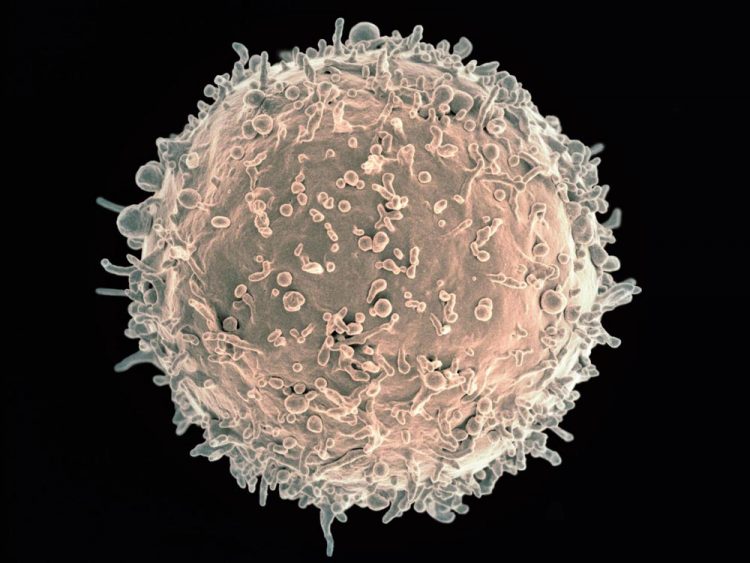During HIV infection, antibody can block B cells from fighting pathogens

Colorized scanning electron micrograph of a B cell from a human donor. Credit: NIAID
For the first time, scientists have shown that in certain people living with HIV, a type of antibody called immunoglobulin G3 (IgG3) stops the immune system's B cells from doing their normal job of fighting pathogens. This phenomenon appears to be one way the body tries to reduce the potentially damaging effects of immune-system hyperactivity caused by the presence of HIV, according to the investigators, but in so doing, it also impairs normal immune function.
The research was led by scientists in the Laboratory of Immunoregulation and the Laboratory of Immunogenetics at the National Institute of Allergy and Infectious Diseases (NIAID), part of the National Institutes of Health.
The investigators made their discovery by analyzing blood samples from 83 HIV-uninfected, anonymous donors and 108 people who were living with HIV at various stages of infection. The people living with HIV came from a variety of racial and ethnic backgrounds. Some of these people were being treated for their infection, while others had not yet begun therapy.
The scientists observed that IgG3 appeared on the surface of B cells only under certain conditions. It appeared in people living with HIV, but not in HIV-uninfected people. Also, IgG3 predominantly appeared on B cells of people of African American or black African decent during the chronic phase of untreated HIV infection when the virus was not adequately controlled.
A site on B cells called the B-cell receptor normally binds to foreign entities such as pathogens. This binding stimulates the B cell to produce many copies of the antibody form of the receptor, which can trap a pathogen and mark it for destruction. The scientists found that IgG3 short-circuits this process in certain people living with HIV by docking on the B-cell receptor, blocking it from adequately responding to the pathogen or other intended target. The researchers also demonstrated how other components of the immune system contribute to IgG3 interference with normal B-cell function during HIV infection. Finally, they showed that IgG3 stops binding to B-cell receptors when a chronically infected person starts treatment that controls the virus, illustrating that the IgG3 activity is directly linked to the presence of HIV during chronic infection.
###
ARTICLE: L Kardava et al. Immunoglobulin G3 regulates tissue-like memory B cells in HIV-infected individuals. Nature Immunology DOI: 10.1038/s41590-018-0180-5 (2018).
WHO: Susan Moir, Ph.D., chief of the B-Cell Immunology Unit in the NIAID Laboratory of Immunoregulation, is available for comment.
CONTACT: To schedule interviews, please contact Laura Leifman, (301) 402-1663, laura.sivitz@nih.gov.
NIAID conducts and supports research–at NIH, throughout the United States, and worldwide–to study the causes of infectious and immune-mediated diseases, and to develop better means of preventing, diagnosing and treating these illnesses. News releases, fact sheets and other NIAID-related materials are available on the NIAID website.
About the National Institutes of Health (NIH): NIH, the nation's medical research agency, includes 27 Institutes and Centers and is a component of the U.S. Department of Health and Human Services. NIH is the primary federal agency conducting and supporting basic, clinical, and translational medical research, and is investigating the causes, treatments, and cures for both common and rare diseases. For more information about NIH and its programs, visit http://www.
NIH…Turning Discovery Into Health®
Media Contact
More Information:
http://dx.doi.org/10.1038/s41590-018-0180-5All latest news from the category: Life Sciences and Chemistry
Articles and reports from the Life Sciences and chemistry area deal with applied and basic research into modern biology, chemistry and human medicine.
Valuable information can be found on a range of life sciences fields including bacteriology, biochemistry, bionics, bioinformatics, biophysics, biotechnology, genetics, geobotany, human biology, marine biology, microbiology, molecular biology, cellular biology, zoology, bioinorganic chemistry, microchemistry and environmental chemistry.
Newest articles

First-of-its-kind study uses remote sensing to monitor plastic debris in rivers and lakes
Remote sensing creates a cost-effective solution to monitoring plastic pollution. A first-of-its-kind study from researchers at the University of Minnesota Twin Cities shows how remote sensing can help monitor and…

Laser-based artificial neuron mimics nerve cell functions at lightning speed
With a processing speed a billion times faster than nature, chip-based laser neuron could help advance AI tasks such as pattern recognition and sequence prediction. Researchers have developed a laser-based…

Optimising the processing of plastic waste
Just one look in the yellow bin reveals a colourful jumble of different types of plastic. However, the purer and more uniform plastic waste is, the easier it is to…



